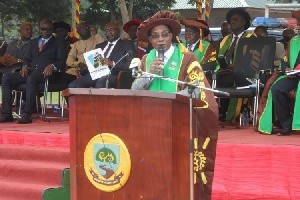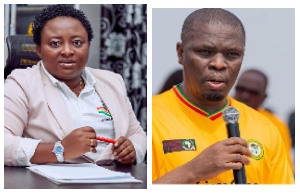The University of Energy and Natural Resources (UENR) has appealed for a seed money of GH¢50 million and an annual cash allocation of GH¢10 million for the next 10 years.
That would enable the University to have some relief because “it is saddled with debts” due to non-release of funds for goods and services by government over the past three years.
The University, therefore, has not been able to meet its financial obligations and consequently it owed most of its service providers and suppliers.
The seed money would again allow the University to meet the high cost of running a multi-campus system and also implement its “Ten-Year Strategic Plan” (2016-2026) which was launched on April 8, 2016.
The Vice-Chancellor Professor Harrison Kwame Dapaah made the appeal when the Vice President, Dr Mahamudu Bawumia, addressed the second congregation of the University in Sunyani on Saturday, which saw 628 students graduating after pursuing four-year bachelor’s degree courses.
They comprised 299 from the School of Engineering, 110 from the School of Science and 219 from the School of Natural Resources.
Prof. Dapaah said as a young and growing institution, UENR was faced with a number of infrastructural challenges, including lack of lecture hall complex for each of the campuses, halls of residence, and offices for staff and housing for teaching and non-teaching staff.
Currently, he said the University was using its uncompleted library and Information and Communication Technology (ICT) Complex as lecture hall while re-accreditation of most of its programmes required a well-functioning library and ICT facilities.
Prof. Dapaah said the Ghana Education Trust Fund (GETFund) projects had come to a standstill and the contractors had abandoned them due to non-payment.
“Our laboratories are inadequate and, therefore, in some of the courses, we have no option than to bus some of the students to Kwame Nkrumah University of Science and Technology for practicals at high bench fees”, he said.
Prof. Dapaah expressed worry that recruitment and replacement of staff for the University was a challenge, adding “Financial clearance for 2016 for recruitment is yet to be approved by the Ministry of Finance”.
“But all other Universities, except our University, received some form of approvals for 2016,” he said.
The situation had resulted in the University’s inability to meet the National Council for Tertiary Education’s norms relating to student-staff ratio.
Prof. Dapaah said currently over 60 part-time lecturers and 70 casual staff had been engaged by the University to enable academic life to continue at “a huge financial burden”.
He mentioned transportation, technical and security, fibre optic cabling of three campuses, books and teaching aids and fencing of the University as some of the challenges.
General News of Monday, 14 August 2017
Source: GNA

















